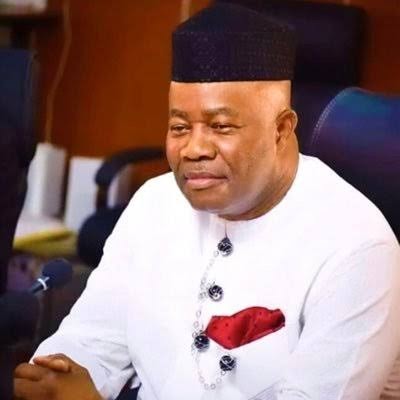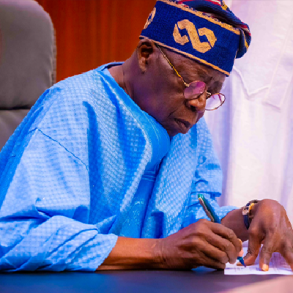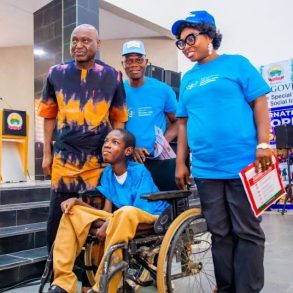The President of the Senate, Godswill Akpabio, says developing resilience is part of measures to proffer solutions to current and emerging security threats across the globe.
Akpabio made the call at the Graduation Dinner/Award Night for the participants of the National Defence College Course 31 on Wednesday in Abuja.
Akpabio was represented by the Chairman, Senate Committee on Navy, Senator Gbenga Daniel.
Akpabio said the college had invested so much in nurturing and equipping the participants with requisite, strategic knowledge in the past 11 months of intellectual toil, pressure and anxiety.
According to him, the nation demanded that the government delivered a dividend of democracy based on the ‘Renewed Hope Agenda’ of President Bola Tinubu and improve the quality of governance.
“So I look forward to receiving the thoughtful and workable solutions to the myriads of challenges bedevilling our nation.
“We also remember that the nation is also caught up in global challenges, which have far-reaching consequences.
“Meanwhile, the world has grown from the external defensive approach to security management, where the military and security agency are forced to be the exclusive custodians of security globally,” he said.
According to him, the whole of society’s approach to security management had been heralded as the way to go for matters of security.
“Also war has several factors both external and internal, that easily affect the security of nations and it behoves the security to develop resilience to all the dynamics that impart negatively on our national security.
“It is, however, heartwarming to note that for this Course 31, the theme was ‘Building Resilience for National Security Development.
“It is my sincere hope that the solutions emanating from this college will become veritable tools that will enhance defence transformation and national security in years ahead,” he said.
Akpabio said that the defence corporation with friendly nations in Africa and the world had brought great benefits to Nigeria and other members, and expressed appreciation to foreign participants for partnering with Nigeria and the National Defence College.
He urged the international participants from 21 allied nations to be proud alumni of the college in their respective country’s armed forces.
The Commandant of the College, Rear Admiral Olumuyiwa Olotu, said the participants had understood and appreciated the fact that the course was designed to test their resilience and ability to make difficult and complex decisions in times of uncertainty, stress and strain.
He said the strategic environment was volatile, uncertain, complex, and ambiguous, saying their ability to pull through the complexity and uncertainty was what made them strategic leaders.
Olotu expressed the hope that the knowledge and experience gained while on the course would distinguish them in whatever leadership positions they find themselves in the future.
“I would like to reiterate to the participants that you need to always remember that strategic decision-making is anchored on teamwork.
“You must have been told severally that you are strong as your weakest link and this philosophy is reflected in the group-based exercises you carried out during your training in the college.
“For a long time, however, teamwork has now been really understood to mean intra-service solidarity. That is important, but we know today that the era of single-service activities is gone.
“You must learn and live here thinking of yourselves as officers of the armed forces of Nigeria or armed forces of your various countries for our international participants as opposed to Army, Navy or Air Force officers.
“Additionally, going by the nature of today’s realities, the need to keep a tab on your contemporaries from other security organisations and ministries, departments and agencies is extremely important,” Akpabio said.
The commandant re-emphasised the doctrine of joint service which, according to him, emphasised joint planning and operations.
He also charged the participants to always remember that their role was to uphold the tenets of democracy and the dictates of the constitutions of their respective countries.
“In this regard, we are supposed to engage our negotiations and dialogue skills as exemplified during the Higher Defense Management module of the course we just completed.
“Additionally, knowing that kinetic actions in themselves are not a means to an end in modern conflict, the need to embrace the whole-of-society approach in all our strategic engagements cannot be overemphasised.
“This inevitably underscores the necessity for integrated thinking, planning and execution as the civilian population is no less crucial in military operations.
“Indeed, there is hardly any operation today that does not involve the civil populace, directly or indirectly, either as actors or victims. It is For these reasons that the participation of the police and other security agencies, as well as civilians from strategic ministries, departments and agencies on the course has become inevitable,” he said.
The News Agency of Nigeria graduation dinner is usually the climax of activities lined up for the graduation ceremony of NDC course participants annually.
The course usually runs for 11 months of intensive strategic and higher defence training for officers from the rank of Colonel and above for the three services, as well as the police and strategic MDAs.
The graduation and induction of the participants as fellows of the NDC will take place on Friday with the President as the special guest of honour.
Source: NAN






